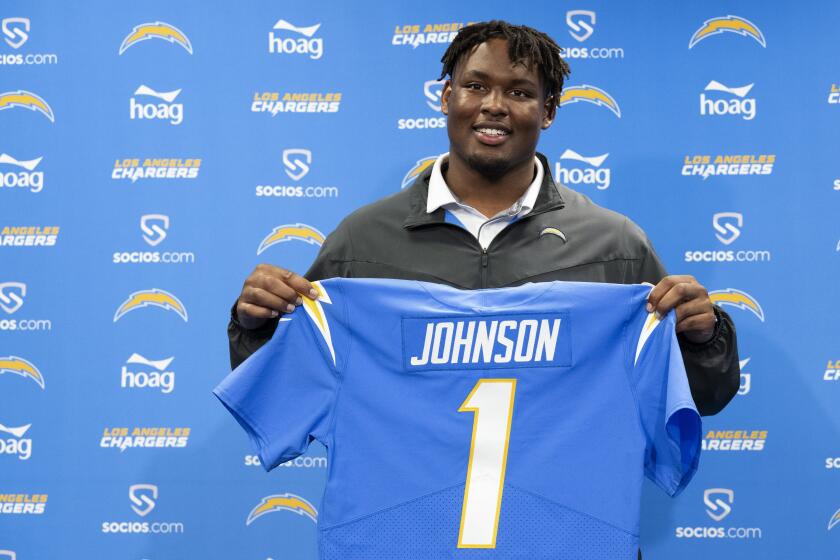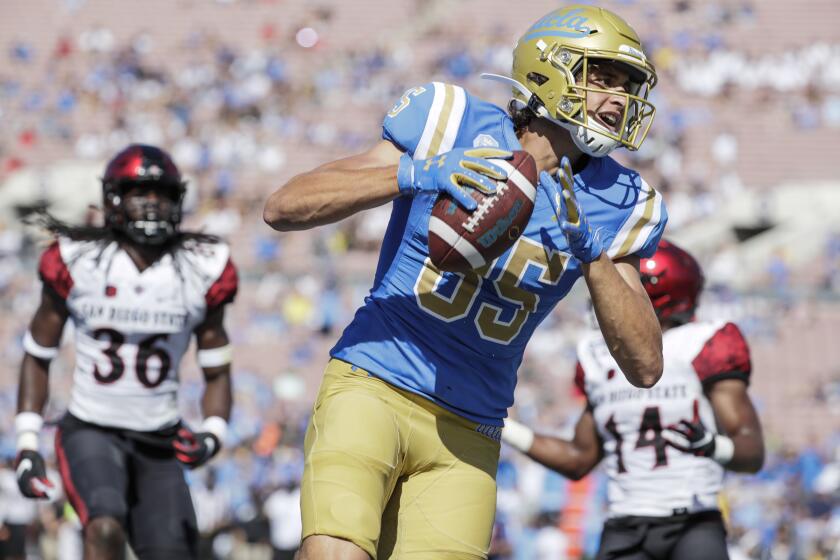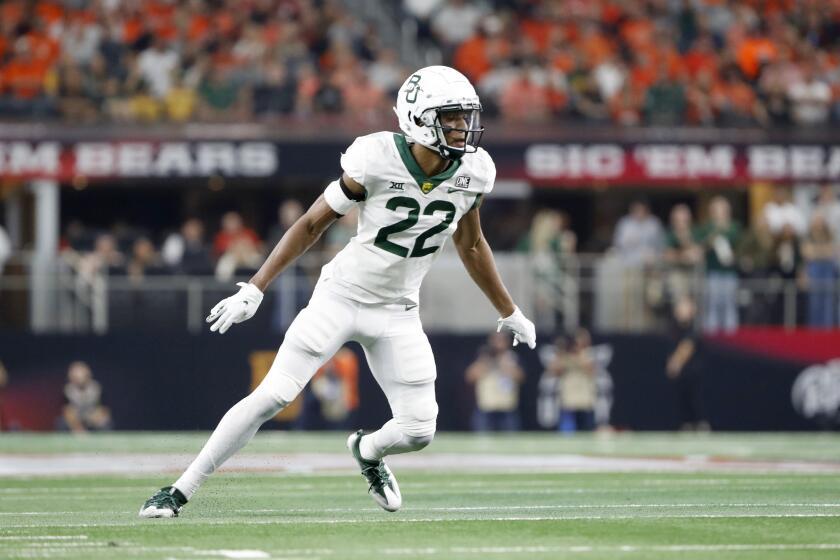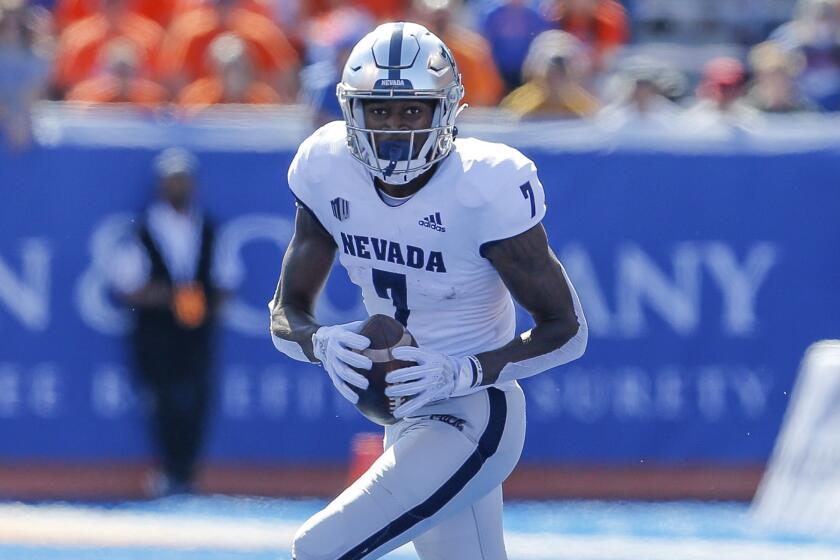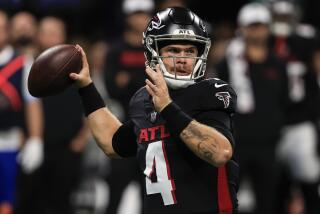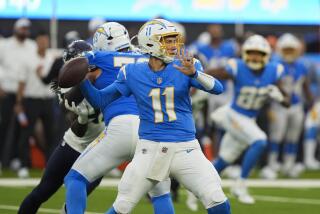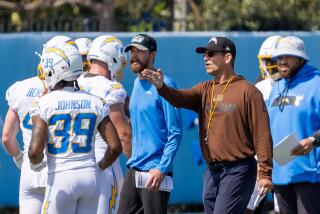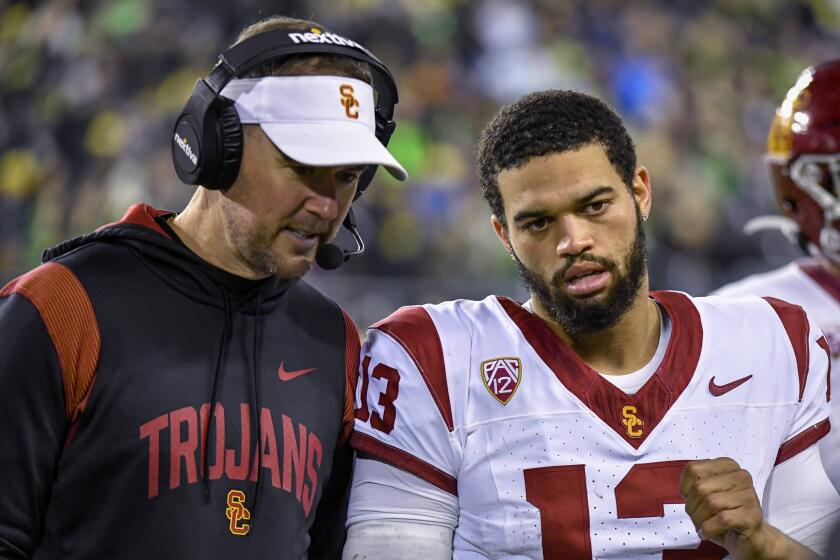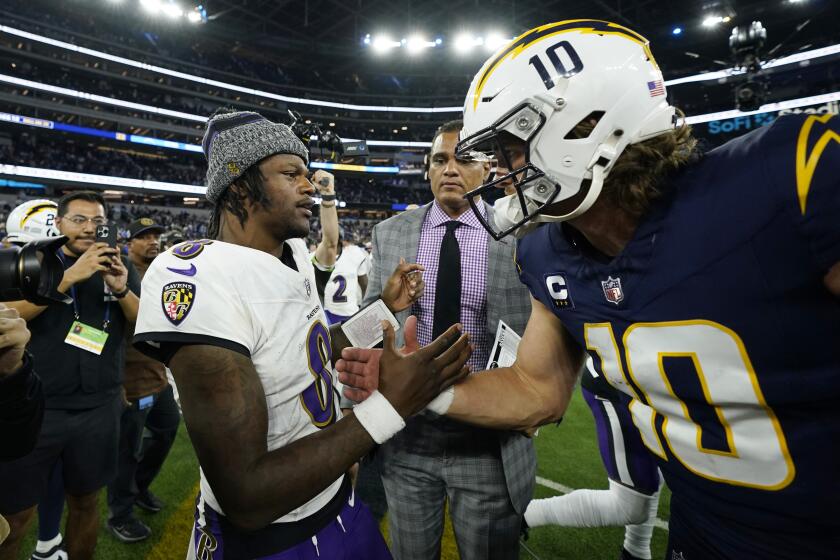NFL draft 2022 takeaways: Not perfect for Chargers, but look at holes they filled
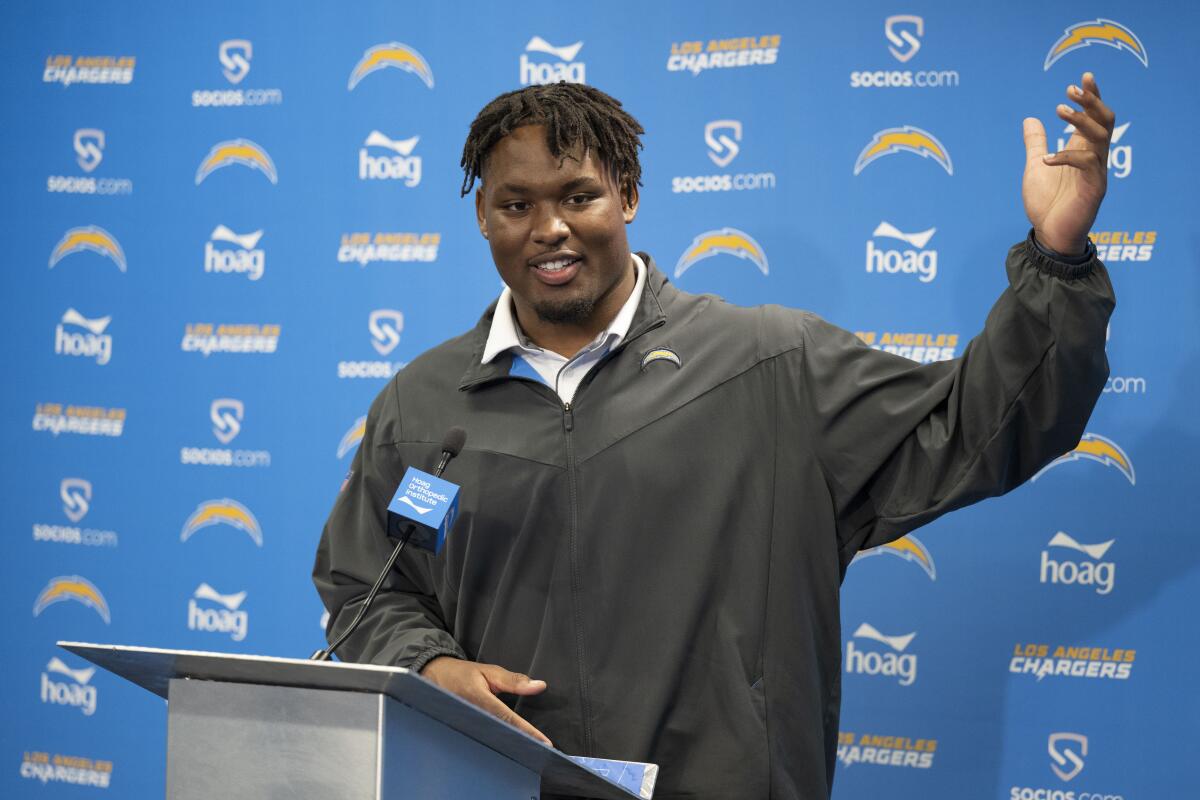
The process began with a guard and ended with a fullback and, in between, the Chargers selected only one traditional skill player.
Yes, the 2022 draft lacked sex appeal for this team but still served as the latest rebuilding block for a franchise trying to return to the playoffs for the first time since the 2018 season.
After making six picks over the final four rounds Saturday, the Chargers ended up taking four offensive players and four defensive players, each from a Power Five conference.
“It never goes perfect because you can’t control everything,” general manager Tom Telesco said. “But it was a good weekend of work.”
Recap of the Chargers’ 10th draft under Telesco and second under head coach Brandon Staley:
Los Angeles Times Chargers beat writer Jeff Miller examines every NFL draft pick by the team:
Off to a solid start: The gem of this class came at the top, at No. 17 overall. That’s where the Chargers drafted Boston College’s Zion Johnson, who is expected to take over as the starting right guard.
By adding Johnson, the Chargers hope to be able to offer a more balanced rushing attack after relying too heavily on the left side of their offensive line in 2021.
Staley explained that Johnson also will bolster the Chargers’ inside protection for quarterback Justin Herbert. He called that boost “the most important thing” since it’s easier to offer help against pass rushers coming off the edge.
The Chargers drafted a second offensive lineman in the sixth round, Jamaree Salyer out of Georgia. Pro Football Focus had Salyer as the 66th-best prospect, but he was still available to the Chargers at No. 195.
“One of the biggest steals of Day 3,” wrote a PFF analyst.
Salyer brings versatility after playing throughout the offensive line for the Bulldogs. Although he was primarily a tackle in college, Salyer will start his NFL career at guard, Staley said.
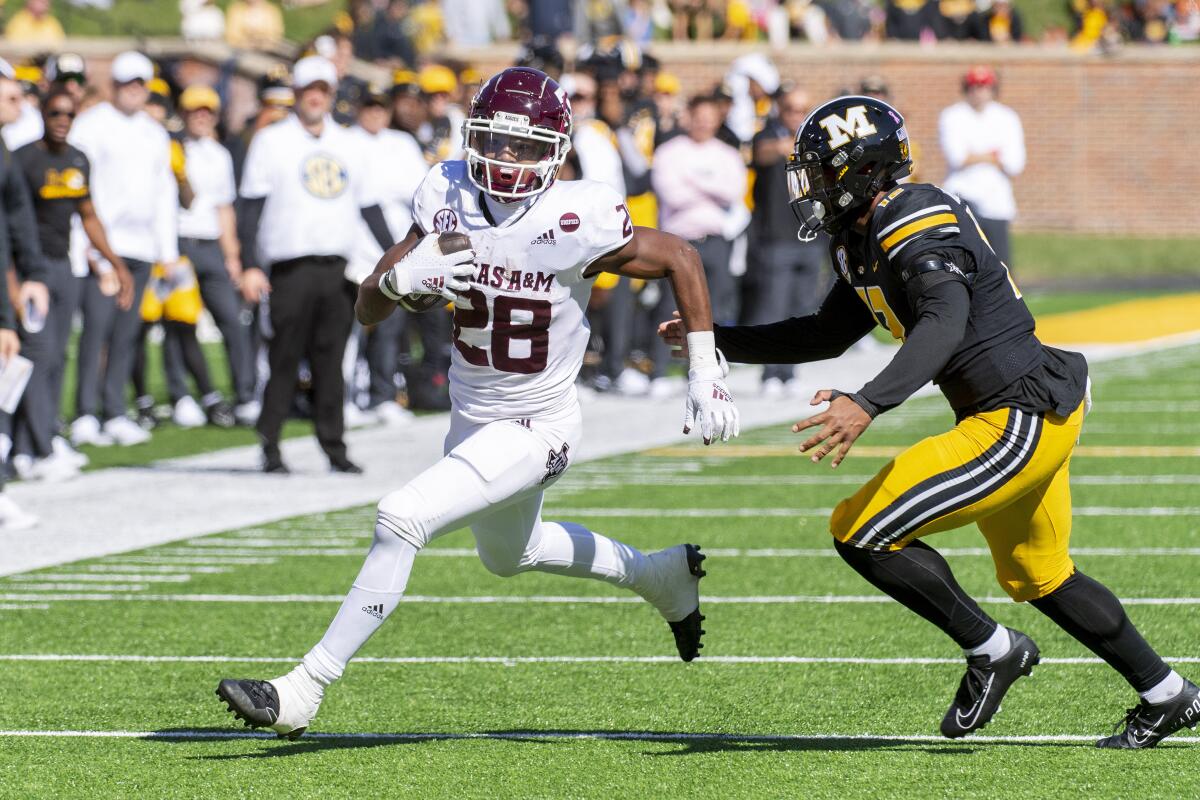
Still seeking a second running back: For the third consecutive draft, the Chargers added a running back, taking Isaiah Spiller out of Texas A&M with the 18th pick of the fourth round.
He’ll compete with Joshua Kelley (fourth round in 2020) and Larry Rountree III (sixth round in 2021) to be Austin Ekeler’s primary backup.
The Chargers have been searching for someone to spell Ekeler, who acknowledged last season that the grind wore on him a bit.
In offensive coordinator Joe Lombardi’s system, the running back also is expected to be an option in the passing game. Spiller had 74 receptions for 585 yards and one touchdown during three college seasons.
“My receiving skills are really good,” he said. “I’ve always caught the ball … so it’s not a problem for me.”
NFL draft 2022: Every team was looking to improve via draft picks. Los Angeles Times Pro Football Hall of Fame writer Sam Farmer assesses each team’s performance.
Spiller credited his father, Fred, for his growth as a receiver. Fred was a tight end at Texas A&M.
Staley said the Chargers like that Spiller played in a pro-style system under head coach Jimbo Fisher, which suggests an easier transition into the NFL. He also praised Spiller’s abilities in pass protection and as a receiver.
“From a pass-catching standpoint, there was a lot of production,” said Staley, who noted that Spiller is a “smooth, natural pass-catcher [with] soft hands.”
Staying close to (his college) home: The Chargers made a local selection in the fifth round when they took UCLA defensive tackle Otito Ogbonnia at No. 160.
Ogbonnia said he had a sense he would be a Charger all along.
“Ever since I visited them, I had a feeling that I was going there,” he said. “I kind of manifested it, in a way, almost tried not to jinx myself. But it ended up happening, and I’m forever grateful for it.”
Ogbonnia is expected to provide depth in a defense that has been revamped since the end of the 2021 season.
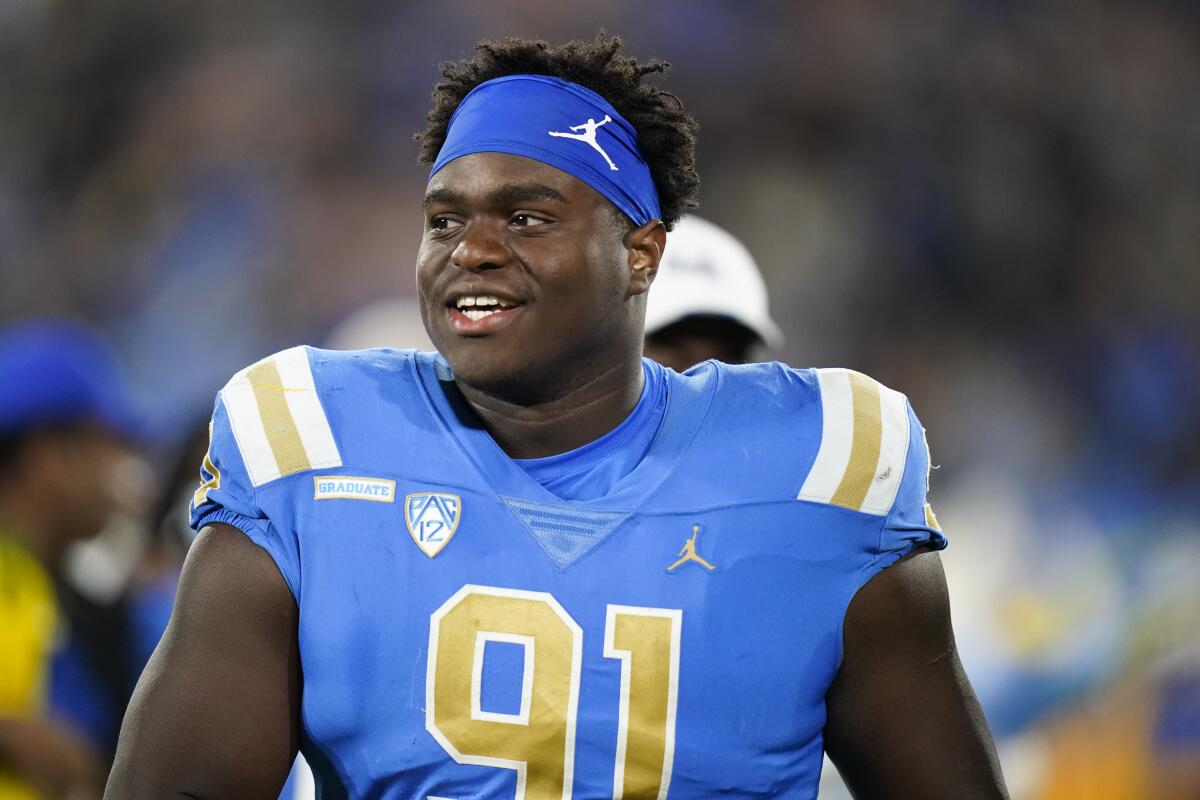
Trying to get bigger across the front, the Chargers coveted Ogbonnia’s combination of size (6 feet 4, 324 pounds) and speed.
“For a big man,” Staley said, “you can really see this guy run and go chase the football.”
In particular, Staley noted Ogbonnia’s efforts on the perimeter against Louisiana State and Oregon last season. He also said Ogbonnia fared well at the Senior Bowl working against Zion Johnson.
Waiting on cornerbacks: Several mock drafts had the Chargers selecting a cornerback early, the idea being they need additional depth, particularly given the inconsistency of Michael Davis last year.
Instead, they didn’t take a corner until rounds six and seven, when they grabbed Wake Forest’s Ja’Sir Taylor and Mississippi’s Deane Leonard, respectively.
Staley explained that the ability of safeties Derwin James Jr., Nasir Adderley, Mark Webb and JT Woods (drafted in the third round Friday) to play in the slot is the equivalent of more corner depth.
After addressing the offensive line in Round 1 of the NFL draft, the Chargers switched to the defense in Round 3 by picking speedy Baylor safety JT Woods.
Not getting edgy: The Chargers didn’t draft an edge rusher, which was surprising. After Joey Bosa and Khalil Mack, they have Chris Rumph II and Jamal Davis II, a free agent signed out of the CFL.
Bosa has dealt with concussion issues and other injuries and Mack is coming off a season in which he had season-ending foot surgery.
Following the draft, the Chargers did sign Ty Shelby, an edge rusher out of Louisiana Monroe.
Staley said the team will continue looking for edge help, suggesting the search could extend through training camp.
Receiver pick just doesn’t happen: The Chargers also were unable to secure a speedy wide receiver, a position they had researched. Staley said the draft unfolded in a way that worked against adding a receiver.
“We were definitely going to take a best-player-approach in this draft,” he said. “It just didn’t work out that way.”
Afterward, they did sign Trevon Bradford, an undrafted free-agent wide receiver from Oregon State.
Which SoCal high school stars were taken in NFL draft? Jefferson High and Nevada standout Romeo Doubs taken by Green Bay Packers.
Southern-fried Chargers: Salyer is the third player the Chargers have drafted out of Georgia over the last two years. In 2021, they took Webb and tight end Tre’ McKitty.
“That’s a good sign because,” Staley said, “they’re the best team in the country right now.”
Staley has a developing relationship with Bulldogs coach Kirby Smart; he spoke at a clinic at Georgia. That relationship could be paying off for the Chargers.
Over the last two drafts, seven of their 17 selections have come from the Southeastern Conference.
“I like that because that league is the best league in the country,” Staley said. “There’s a reason why more people are drafted in that league than any other.”
Etc.
The Chargers signed 14 undrafted free agents Saturday: WR Bradford, Oregon State; RB Leddie Brown, West Virginia; TE Erik Krommenhoek, USC; S Raheem Layne, Indiana; LB Tyreek Maddox-Williams, Rutgers; RB Kevin Marks Jr., Buffalo; K James McCourt, Illinois; QB Brandon Peters, Illinois; CB Brandon Sebastian, Boston College; edge rusher Shelby, Louisiana Monroe; TE Stone Smartt, Old Dominion; S Skyler Thomas, Liberty; T Andrew Trainer, William & Mary; and C Isaac Weaver, Old Dominion.
More to Read
Go beyond the scoreboard
Get the latest on L.A.'s teams in the daily Sports Report newsletter.
You may occasionally receive promotional content from the Los Angeles Times.

